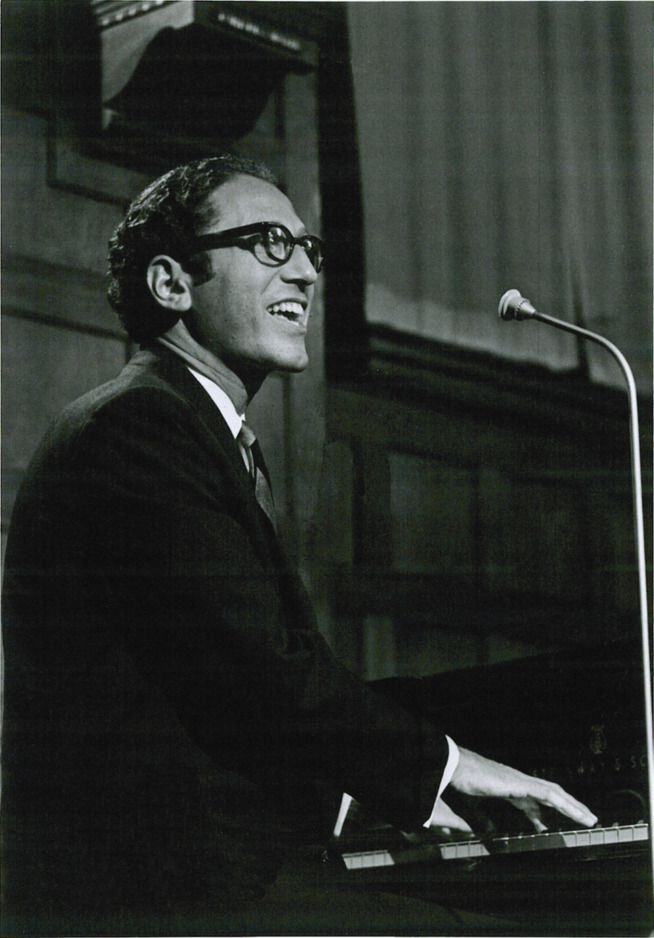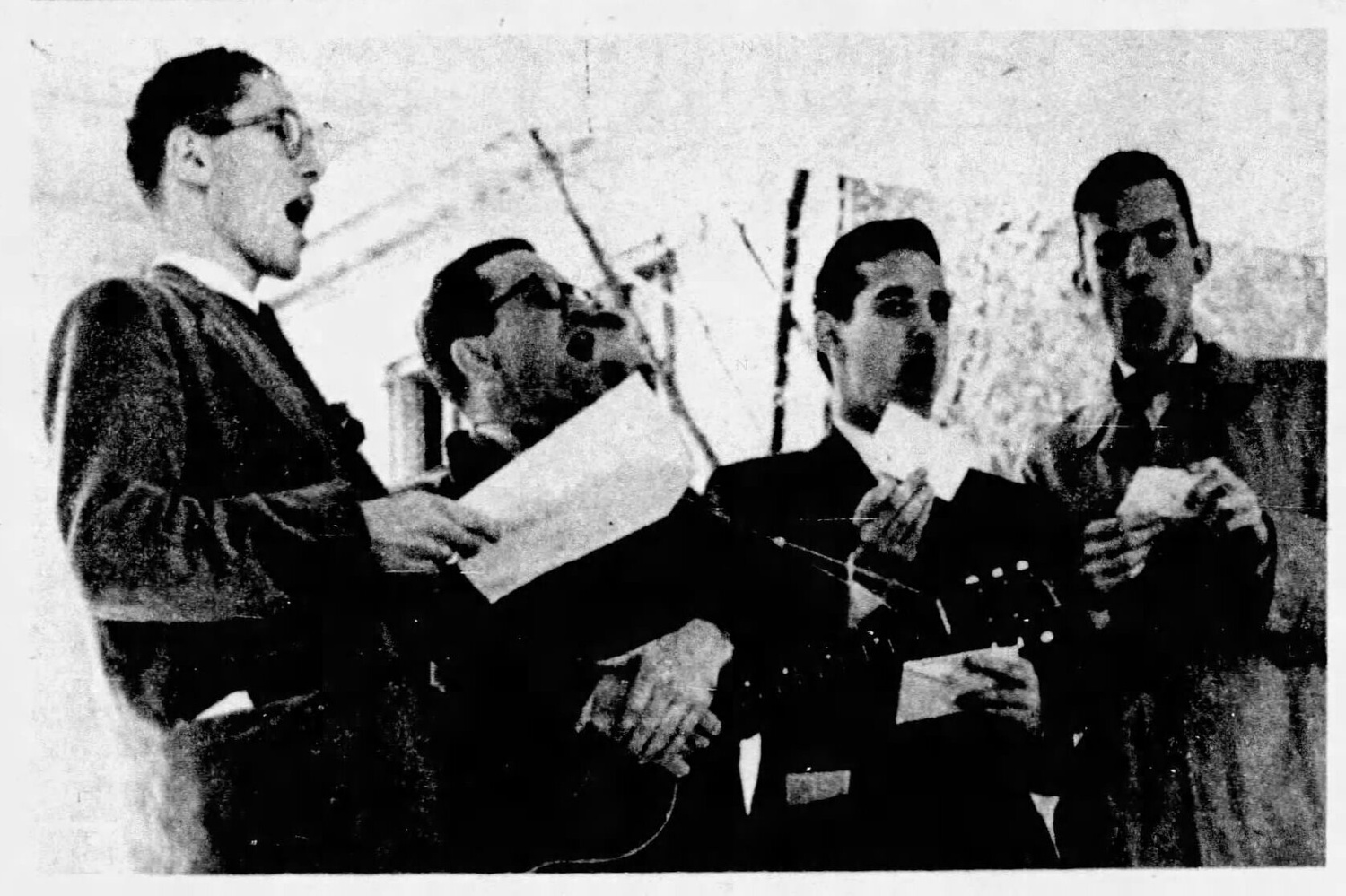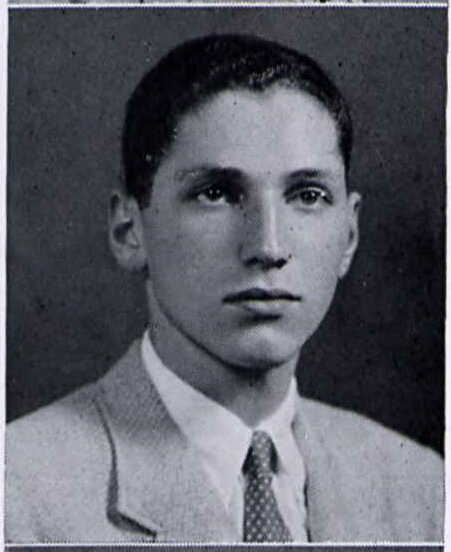Tom Lehrer ’47, Mathematician and Musician Who Set Wicked Satire to Cheery Tunes, Dies at 97
Thomas A. Lehrer ’47 — a beloved musician and mathematics instructor who set sardonic commentary to upbeat piano melodies — died on July 26. He was 97.
Thomas A. Lehrer ’47 never considered himself an entertainer.
Trained as a mathematician, Lehrer quickly developed a following as a musical satirist, offering sardonic political and social commentary set to upbeat piano melodies. Despite his success — his first album, initially made just for mail orders, ended up selling half a million copies and made top-ten charts in the United Kingdom — he played his last public show in 1972. He devoted the majority of his time to teaching mathematics and musical theater.
Anthony J. Tromba, who sat on the committee that hired Lehrer as a lecturer at the University of California, Santa Cruz, said that instead, Lehrer would have considered himself an educator and communicator.
“He liked making people happy,” Tromba said. “He communicated through singing, and he was really committed to educating people, and he loved mathematics and liked to teach people why it was important, significant.”
Lehrer died on July 26, at his home in Cambridge. He was 97.
Lehrer was born in New York City — where he eschewed lessons in classical piano in favor of a teacher who would let him play Broadway showtunes — and attended the Loomis Chaffee School in Windsor, Connecticut before entering Harvard at age 15 for a degree in mathematics.
He graduated Harvard at 18, and earned a master’s, also in mathematics, the following year. He would pursue doctoral studies at Harvard and at Columbia University on and off for more than a decade after, but he never completed a thesis.
Tromba said the eventual departure suited Lehrer, who — in Tromba’s eyes — “really wasn’t” a mathematician at heart, either.
“He could have gotten a Ph.D. and wound up teaching, being a professor, in Iowa, but this was not for him,” Tromba added. “He was not headed towards Iowa.”
Lehrer’s musical career began at Harvard, where he wrote songs to make himself and his peers laugh. He penned “Fight Fiercely, Harvard,” a parodic football song that still makes appearances at Crimson football games, in 1945. In 2000, he told the New York Times that “it never dawned on me that all these years later, well, I wrote ‘Fight Fiercely, Harvard’ in 1945 and the band plays it at half-times now, 55 years later.”
And Harvard squares off with the Trump administration, the song — which genteelly urges football players to “hurl that spheroid down the field” — has become a protest anthem of sorts, too.
Shortly after Lehrer’s graduation, he delivered a musical performance in Allston Burr Hall that packed the now-defunct auditorium’s 500 seats.
“The audience stopped laughing only long enough to listen to the next gag,” The Crimson reported at the time.

Lehrer released his debut album, “Songs by Tom Lehrer,” in 1953, when he was a graduate student at Harvard. He performed his songs at nightclubs in New York, Boston, San Francisco, and Los Angeles during his doctoral years. The Crimson reported that year that “Lehrer has been convulsing party, night club, and House Dance audiences with the wit and skillful presentations of songs he has composed.”
He would release his second and third albums in 1959, a studio album and a live recording, and a fourth and final work in 1965.
Accompanying himself on piano, Lehrer penned and played music that was alternately educational — one of his most known works was “The Elements,” a litany of all the elements on the periodic table set to a Gilbert and Sullivan tune — and dark. Another song, “We Will All Go Together When We Go,” reflected on mutually assured nuclear destruction, declaring against a cheery accompaniment, “For if the bomb that drops on you / Gets your friends and neighbors too / There’ll be nobody left to grieve.”
Tromba, who was a visiting graduate student in 1968, recalled that, “spending a year at Harvard, you can’t escape Tom Lehrer in those days.”
But fame did not agree with Lehrer. He told The Crimson in 1959 that “I don't feel the ‘waves of love’ they tell you an entertainer is supposed to feel. The hardest thing is to make it look as if you’re enjoying it.” He stopped performing concerts in 1967.
He was also reticent about his personal life — Lehrer never married or had children and leaves no immediate survivors — and told the New York Times in 2000 that “I’m not interested in promoting myself, or revealing to total strangers anything about me. That's not my job.”
Through the 1960s and early 1970s, he would contribute music to satirical and children’s television programs. In 1980, his work was picked up by the British theater producer Cameron Mackintosh for a revue titled “Tomfoolery.”
In a statement to Deadline after Lehrer’s death, Mackintosh called his collaboration with Lehrer “a perfect blendship” and added that oeuvre remains “terrifyingly relevant.”

Lehrer, however, had mostly quit writing by the 1970s. “The Vietnam War is what changed it,” Lehrer told the New York Times in 1981, at a New York performance of Tomfoolery. “Everybody got earnest. My purpose was to make people laugh and not applaud. If the audience applauds they’re just showing they agree with me.”
“But that’s not humor,” he added. “So I dropped out just in time.”
In an alternate explanation for his departure from musical comedy, Lehrer quipped in 1973 that “political satire became obsolete when Henry Kissinger was awarded the Nobel Peace Prize.”
In 2020, Lehrer relinquished all his rights to his songs, writing on his website in 2022 that “I no longer retain any rights to any of my songs. So help yourselves, and don’t send me any money.”

As he became increasingly closed off from public life, Lehrer was also building a robust academic career.
He did a brief stint in the army and spent a short time as a researcher for the Atomic Energy Commission in Los Alamos, New Mexico in the 1950s, but quickly returned to Cambridge, where he taught math at Harvard, MIT, and Wellesley.
In 1972, he began a 29-year stint as lecturer at the University of California, Santa Cruz, where he would spend the winter months every year, even after he retired in 2001. Lehrer was drawn to southern California by warm weather and UCSC’s emphasis on inviting professors who did not necessarily have Ph.D.’s, but rather practiced in their fields. There, he taught three wildly popular classes: a review of American musical theater open only to students who auditioned, and two math courses, one in the philosophy of math and another in how math is applied in the social sciences.
Tromba said that, ultimately, Lehrer would have wanted to be remembered as “an enormously successful educator.”
“How many mathematicians really give a damn about explaining why they do mathematics?” Tromba added. “They go in and they teach advanced analysis — ‘ladies and gentlemen, I will now define a matrix.’”
Lehrer, he said, “just wrote a derivative song.”
—Staff writer Sophie Gao can be reached at sophie.gao@thecrimson.com. Follow her on X @sophiegao22.
—Staff writer Sarah F. Silverman can be reached at sarah.silverman@thecrimson.com.
